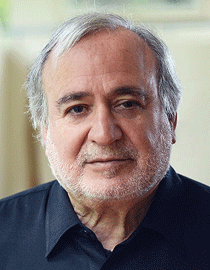Trump indicted: ‘These are uncharted legal and political waters’
Berkeley scholars say the historic indictment could have ramifications not just in criminal law, but in politics, national security and international relations.
March 30, 2023

Former President Donald Trump has been indicted in New York and faces other ongoing criminal investigations. The ramifications could extend globally, Berkeley scholars say. (AP photo by Sue Ogrocki)
A grand jury in New York has voted to indict former President Donald Trump on charges related to his alleged payment of hush money to adult film actress Stormy Daniels, setting the stage for the first-ever criminal prosecution of a former or sitting U.S. president.
Trump has steadfastly denied that he paid Daniels to keep quiet about their liaison before the 2016 presidential election. Now the grand jury’s vote is expected to precipitate an extraordinary legal action that will be watched around the world.
Other ongoing criminal investigations could compound Trump’s legal jeopardy, but Berkeley scholars say the impact could extend far beyond the legal sphere.
The legal challenges seem likely to hurt Trump politically, some said — but they also could help him win the 2024 Republican nomination. The impacts also could extend to the realms of domestic stability, national security and international relations.
Berkeley News queried top campus scholars for their insights on the indictment.
In constitutional and legal terms, what is the overarching significance of this indictment?

Erwin Chemerinsky (Berkeley Law photo)
The indictment of a former president of the United States is unprecedented. There is reason for concern that this will inspire Republicans to look for a way to indict Joe Biden and future Democratic presidents after they leave office. Already Republican leaders have decried this indictment as political.
But despite these attacks and the worry of what precedent this might set, New York District Attorney Alvin Bragg Jr. did exactly the right thing. The core of the rule of law is that no person is above the law. If Trump committed a crime, he should be indicted and prosecuted. The alternative, far more frightening, is to say that once a person has been elected president there is a life-time “get out of jail free” card that provides full immunity from criminal charges.
There are only two relevant questions in evaluating the Trump indictment: Did the grand jury have sufficient reason to believe that Donald Trump authorized the payment of $130,000 to Stormy Daniels in exchange for her remaining silent about their sexual relationship, as she and his former attorney, Michael Cohen, allege? And if so, is there sufficient reason to believe that this violates New York law, including in the fraudulent way it was recorded and not reported under campaign finance laws?
If the answer to both questions is yes — and from all that is known it appears so — then Bragg and the grand jury were completely justified. Indicting Trump thus is essential to send a message to all: No one, not even a former president, is above the law.
— Erwin Chemerinsky, dean of the UC Berkeley School of Law and preeminent constitutional scholar
Considering this case and others that appear to be advancing against Trump: How difficult will it be to prosecute a former president who’s also running for reelection? Will such prosecutions be inherently different from prosecutions in a more ordinary criminal case — and if so, what challenges would that pose to judges and attorneys?

Andrea Roth (Berkeley Law photo)
In some respects, the prosecution would not be more difficult merely because the defendant is a former president. He would be arraigned (Trump has indicated he would voluntarily come from Florida to New York if indicted), face a trial date and face a jury verdict just like anyone else. He would have no more or fewer procedural protections than other defendants, and the state has the same powers — subpoena power, for example — it would normally have.
Of course, the case will be high-profile, but other high-profile defendants have been successfully prosecuted. The defense attorneys will surely raise numerous issues, from intent to defraud to a statute of limitations bar, but that is also true in most high-profile cases. The New York case also has no formal consequence for the election; you can be an indicted or even convicted person and run for president. Eugene Debs, a Socialist candidate, ran from prison in the early 1900s.
Informally, of course, the case has major political consequences, which might favor or disfavor Trump, depending on whom you ask. Any trial would likely be close to the 2024 election. These are uncharted legal and political waters, for sure.
— Andrea Roth, professor of law, specialist in criminal law and procedure
For the first time in U.S. history, an ex-president has been indicted on a criminal charge. Do you see any parallels in the history of other democracies about the importance of rule of law and accountability?

Daniela Cammack (Photo by Brittany Hosea-Small)
Imagine a community where any citizen could prosecute a politician for making a false promise, accepting or offering bribes, making an unlawful proposal or proposing a disadvantageous law. Impeachments were invited at a public meeting every month, office-holders underwent a financial and ethical audit every year, and political trials were judged by a mass panel of at least 500 randomly selected and paid citizen volunteers sitting for just one day.
That was the situation in classical democratic Athens. Between 432 and 355 B.C., 35 out of the 143 elected generals whose names we know were impeached, and impeachment was only one of the processes through which Athenian political leaders were brought to trial.
The Athenians assumed that democracy required popular control of the judicial system and that that power should be used to discipline the political elite — not once in a few hundred years, but routinely, and not on criminal charges alone, but on charges related to the ethics of their specific political role.
Which recent politicians would have survived that?
— Daniela Cammack, assistant professor political science, specialist in the history of democracy
Broadly, what impact might the indictment have on voters? More narrowly, how might it play out among Trump’s base?

Gabriel Lenz (UC Berkeley photo)
My instinct is that it may, in the short term, help Trump with the Republican Party and with the Republican base. Voters get attached to their leaders, and they don’t like to see them attacked.
Trump has spent a great deal of energy trying to convince his supporters that Democrats don’t support democracy and are using the power of government to suppress him and his supporters and their democratic rights. They may, to some extent, see this as confirmation.
It doesn’t help that this indictment is coming from a big-city district attorney. It might be different if it were coming first from a Georgia case, a Georgia Republican.
Voters in Trump’s base now may be more likely to donate and more likely to support Trump, and that may increase his chances of winning the nomination. But in the general election, this seems likely to hurt him.
One caveat: General elections are determined, to a considerable extent, by the economy and the state of the world. If the economy is bad, and the state of the world is not so great, you could easily see Trump winning a general election, even if this indictment does hurt him.
— Gabriel Lenz, political scientist and author of Follow the Leader? (University of Chicago Press, 2012)
Given that this case involves Trump’s alleged payment to a porn star to conceal their liaison, what impact could the indictment have among the evangelical Christians and other conservative religious supporters who are essential to his political strength?

Claude S. Fischer (UC Berkeley photo)
Conservative Christians’ allegiance to Trump has been sorely tested before, when the Stormy Daniels case broke and especially when he was heard on tape discussing grabbing women. That he is thrice-divorced and a notorious playboy was also well-known.
In the end, there are religious excuses, basically, that God works through flawed men. Even King David sinned grievously, but he was God’s agent in the world. And even the sinner can find redemption by doing God’s work.
— Claude S. Fischer, sociologist, Distinguished Professor of the Graduate School
Recently, Trump warned of “potential death and destruction” if he’s indicted. How should we interpret that? And is there a chance his loyal base will heed his call to arms?

Lawrence Rosenthal (Photo by Edward Lempinen)
The Republican Party right now is focused on two tracks: Jan. 6th and wokeness. At Trump’s recent rally in Waco, and his incendiary social media posts — they’re all about potential indictments. He doesn’t talk a lot about woke, whereas his most significant competitor, Ron DeSantis, talks nothing but woke.
Trump likes to stick with things that have worked in the past. In 2016, his attacks on Hillary Clinton for using a private email server seemed to work, so in 2020, when he focused on Hunter Biden’s laptop and that didn’t go anywhere, he was profoundly disappointed.
So now, he’s focused on the Jan. 6 crowd — the militia types and their sympathizers. He knows that if he can hold on to this group — maybe 30% of the Republican base, with lots of resonance beyond that — he can win the nomination.
But can he generate another Jan. 6 uprising if he’s indicted? You know, I remember watching that day on TV. Trump was in control of the nation, and his supporters at the Capitol were acting with an utter sense of impunity. Well, that’s gone. The U.S. Justice Department has come down heavily on those people. A lot of them are in jail now.
So, I think it’s deeply unlikely that we’ll see anything like the Jan. 6th riot.
— Lawrence Rosenthal, founder and lead researcher of the UC Berkeley Center for Right-Wing Studies
What impact do you think the indictment might have on the 2024 presidential election? Can Trump survive this indictment and the other cases against him that seem to be advancing? Can he turn these challenges to his advantage?

Eric Schickler (UC Berkeley photo)
It is hard to predict the precise impact of the indictment on the 2024 race. It keeps Trump as the major focus of attention — each candidate will be expected to respond in some way to the indictment.
I think we can expect to see the other candidates condemn the indictment as political, while still trying, in some ways, to differentiate themselves from Trump — for example, instead of defending Trump’s actions, they will say that it does not warrant prosecution.
I think Trump’s campaign can survive the indictments — he needs to hold the support of the roughly 40% of Republicans who have been his core supporters, and there is little reason to think the indictment will drive them away. But in terms of his electability in the longer term, it does not help to have to defend yourself in court, potentially with respect to multiple indictments in different jurisdictions.
— Eric Schickler, political scientist and co-director of the UC Berkeley Institute of Governmental Studies
At least since the end of World War II, the U.S. president has been seen as the leader of the free world. But now an ex-president has been indicted on criminal charges, and he faces additional criminal investigation. How might the indictment play out overseas and in U.S. international relations?

Michaela Mattes (UC Berkeley photo)
The world will be watching the aftermath of President Trump’s indictment. Will the indictment help or hinder his electoral prospects? Will it spawn political violence in the U.S.? Right now, both U.S. foes and friends are likely unsure whether the indictment will be advantageous for them or not.
Our rivals benefit from destabilizing violence in the U.S., since it undermines U.S. hard and soft power. Our adversaries — especially Russia — would also like nothing better than a second Trump presidency. Trump would, in all likelihood, end military aid to Ukraine, paving the way for a Russian victory.
By contrast, our friends and allies dread a second Trump presidency, given its implications for the Ukraine War and for international cooperation more broadly. They would be pleased if the indictment ended up reinforcing the rule of law in the United States, because this strengthens U.S. credibility and leadership abroad.
Given that the effects of the indictment on U.S. politics are not yet clear, it remains an open question of who benefits and who doesn’t. It is exactly that uncertainty that makes Trump’s indictment an event of international interest.
— Michaela Mattes, associate professor in political science, specialist in international relations
What long-term impact might this indictment and others have on the presidency?

Terri Bimes (Photo by Brittany Hosea-Small)
The three potential indictments illustrate the difficulty in holding a president, even a former president, accountable to the law in a polarized nation. In the end, these cases could have a big impact on the individual Donald Trump, but a more limited impact on the office of the presidency.
The case upon which the first indictment is based, involving the Stormy Daniels hush money payment, happened just before the 2016 election and seems likely to have the least long-term effect on the presidency. Some analysts say this indictment will likely result in a potential charge of bookkeeping fraud. The other two possible indictments — one involving Trump’s efforts to overturn the 2020 election in Georgia and the other involving Trump’s handling of classified documents — are more substantive, and Trump could possibly be sentenced to prison, if convicted.
These cases thus could have a big impact on the life of Donald Trump, the individual. They show that no individual is above the law — an important democratic principle. The impact of these cases on the presidential office is less clear. There may be reforms about how classified documents are handled. An unintended consequence may be a heavier reliance on state courts, rather than federal courts, to hold presidential candidates and ex-presidents of the opposite party accountable.
— Terri Bimes, teaching professor of political science, specialist in the American presidency